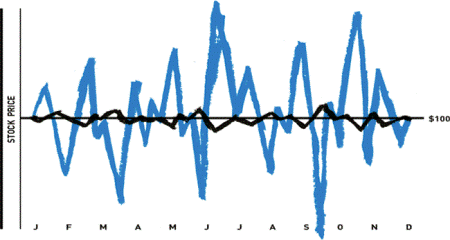Credit Linked Note
April 3, 2025
 Credit Linked Note
Credit Linked Note
Structured finance products have proliferated the financial markets. There are several derivative products that have been created with the sole intention of helping a company transfer its credit risk onto another company or group of investors who are willing to assume this risk. The most well-known and common structured finance product which enables companies to…
 Credit Rating Terminology
Credit Rating Terminology
Credit rating is an important and almost central part of the overall credit risk management function in any organization. Every major organization around the world has implemented credit rating in some form. In many companies, credit rating has been overtaken by credit scoring. Instead of providing a rough range about the creditworthiness of a prospective…
 The COSO Framework for Internal Control
The COSO Framework for Internal Control
Internal frauds are a big part of the operational risk faced by any organization. This is truer of multinational companies who have business interests in various countries across the globe. This is because there are thousands of people in important positions making business decisions on behalf of the company. Hence, ensuring that all these employees…
The average consumer believes that most of the money that insurance companies collect in the form of premium ends up in their bank accounts as profits. The reality is that this is not really the case. The reality is that most of the money, collected from premiums has to be paid back either in the form of claims, operating expenses or taxes. Hence, if insurance were simply about taking in and giving out money, it would not be a very profitable business.
The key point to understand is that there is a time lag between when the money is collected as premium and when it is paid out. Since there is a time lag involved, insurance companies invest the money they receive from other people and receive investment income on the same. This investment income forms a significant chunk of income earned by insurance companies. Since a lot of this money is invested in the stock market, the increasing market volatility has a major impact on the income generated by insurance companies.
In this article, we will try to understand how important investment income is, for insurance companies. We will also try to analyze the impact that stock markets tend to have on these incomes and therefore on the solvency of insurance companies.
Insurance markets across the world have become very competitive. This means that market pressures have reduced the insurance premiums to the bare minimum. As a result, insurance companies only retain about 8 cents as profit for every dollar that they take in as premium.
According to the Insurance Bureau of Canada, about 55% of the money is spent back to service the claims which are generated by policyholders.
A humungous 21% is the administrative cost which is required to service the policy. This includes the cost of paperwork which is sent across to the policyholders as well as the costs required to maintain customer service helplines.
Also, since the insurance industry in North America is heavily taxed, they pay about 16% of the premium received in the form of taxes. As a result, after deducting all the expenses, insurance companies are left with a measly 8% which they can retain in the form of profit.
This is not a sustainable situation since insurance companies are taking far too many risks and therefore 8% is not a fair rate of return. However, this 8% is only the difference between premium collected and money paid out.
As explained above, insurance companies also have a second source of income, i.e. investment income. In many insurance companies, investment income contributes about 50% to the total profit earned by insurance companies. The bottom line is that investment income is critical and can make or break the financials of any insurance company.

The funds held by insurance companies are very tightly regulated. These companies are not at liberty to invest the funds as and when they like. Instead, there are strict guidelines which explain the various sub-limits which have to be followed while investing this money. For instance, most of the money has to be kept in ultra-liquid debt funds since it may have to be retrieved quickly. A relatively small amount of funds can be invested in long term equities. Also, insurance companies may not be permitted to trade in low end penny stocks. Their investments have to be restricted to blue chip stocks only.
Since the value of debt securities is inversely related to interest rates, insurance companies lose money. This has a negative impact on the reserves, i.e. the claim paying ability of the insurance companies. Companies tend to predict these events and invest more money than required. However, at the end of the day, even the most sophisticated insurance company is making a guess. Sometimes these guesses do not work out as intended and have a negative impact on the solvency of the company.
Hence the bottom line is that insurance companies are affected by market volatility in two ways.
Insurance companies are built to handle up to moderate shocks in the stock market and still remain solvent. However, when black swan events occur, and markets lose a large percentage of their market capitalization overnight, insurance companies may end up being one of the first casualties.
Your email address will not be published. Required fields are marked *